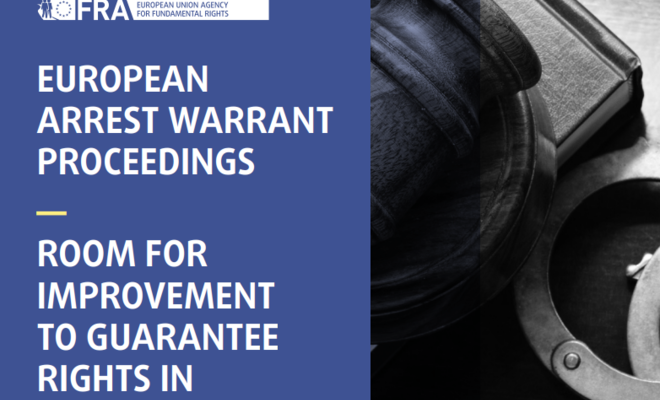European Arrest Warrant proceedings - Room for improvement to guarantee rights in practice

The European Arrest Warrant (EAW) allows Member States to implement judicial decisions issued in another Member State.
It applies to decisions such as arrests for criminal prosecutions or the execution of custodial sentences. After being in force for over 20 years, FRA’s findings provide evidence for an assessment of the legislation in practice. This report looks at the fundamental rights challenges that people face who are requested through an EAW. It provides a unique insight into their experiences and those of the professionals involved. FRA’s findings indicate that shared challenges exist across EU Member States. They must increase efforts to ensure that people can take part in criminal proceedings and receive a fair trial.
“The European Arrest Warrant is a vital tool for enforcing justice across borders. It is part of the system that contains key protections to ensure the rights of those served with the Warrant are respected," says FRA Director Sirpa Rautio. “But theory and practice are sometimes not aligned. This report outlines how the courts and police can ensure that people issued with the Warrant have full access to justice and are tried fairly.”
The European Arrest Warrant Proceedings report examines the rights of defendants - people who have been issued with a warrant - and how they apply in practice. They can be suspects or convicts who fled the country. The report looks at what happens in the country that issues the Warrant and the one that executes it. It identifies real-life challenges, how countries address them and suggests improvements:
- Respect for rights – mutual trust and recognition between national judicial systems is important for cross-border cooperation. However, this can lead the judiciary to overlook personal circumstances, such as ill-health, their family situation, or the detention conditions in the country that issued the Warrant. Countries should assess the wider rights implications of cross-border transfers case-by-case when deciding on extraditions or even consider alternatives to ensuring justice without using the Warrant.
- Right to legal assistance – people should have legal assistance in the country where they are arrested, as well as in the country that issued the warrant. In practice, they often have State-appointed lawyers. Their right to choose a lawyer freely may be hindered by a lack of knowledge and ability to appoint a private lawyer in the arresting country. Legal professionals can be unclear about the need for also appointing lawyers in the issuing country. Defendants are either unaware of their right to such lawyers or do not get help finding one. Countries should provide legal and police training and guidance on all aspects of the Warrant. Countries should also compile, and make available, lists of lawyers experienced in Warrants, so defendants can properly consult them with enough time.
- Right to information - defendants generally receive information about their rights and the reason for the Warrant. But they may be informed late or not fully understand the information provided. This underlines the need for simplified information that avoids legal jargon. Training, checklists and guidance could ensure the police and legal professionals inform those arrested so that defendants fully understand the proceedings.
- Right to interpretation and translation - defendants generally have access to interpreters and translations but often the quality is poor. Sometimes this is due to short deadlines and the difficulty in finding people to translate less widely spoken languages. Pooling interpreters and translators between countries and introducing quality checks could improve understanding of proceedings.
The Council of the EU asked FRA to build on the agency’s earlier research. It draws on desk research and interviews with legal professionals, and those who were issued with the Warrant.
The report covers 19 EU Member States (Belgium, Croatia, Cyprus, Czechia, Estonia, Finland, Germany, Hungary, Ireland, Italy, Latvia, Lithuania, Luxembourg, Malta, Portugal, Slovakia, Slovenia, Spain and Sweden). However, at times there are references to other countries not covered by the research.
The findings are based on information provided during interviews with legal professionals, as well as interviews with persons who were requested by a Member State for surrender under the EAW and their representatives.
The report for Croatia was conducted by the organisations Centre for Peace Studies and Human Rights House Zagreb. It is available here.
Centre for Peace Studies is part of the multidisciplinary research network FRANET of the EU Agency for Fundamental Rights together with the organisations BaBe - Be Active. Be Emancipated. and Human Rights House Zagreb since 2014.



